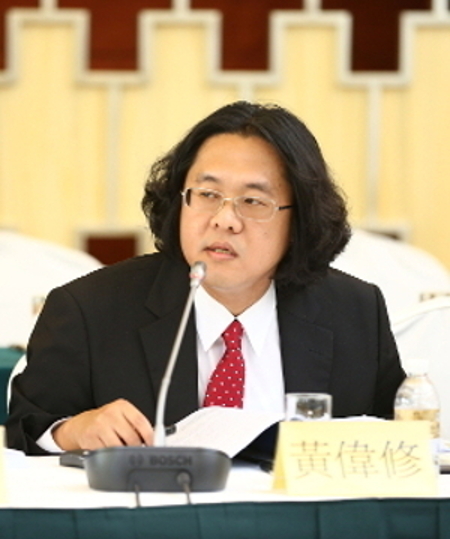 黄伟修现为日本东京大学东洋文化研究所助理教授,他来自台湾,於2010年在日本早稻田大学取得国际关系学博士学位,并曾任日本东京大学东洋文化研究所外国人研究员(2010)丶日本早稻田大学台湾研究所客座研究员(2010~2014)与兼任副研究员(2014~2016)丶日本法政大学政治学研究所(大学院政治学研究科)兼任讲师(2015~2016),目前也担任日本法政大学法学部兼任讲师(2014~)丶日本早稻田大学台湾研究所客座研究员(2016~),专长为台湾的大陆政策决策过程丶两岸关系丶日中关系丶日台关系丶日本的外交与安全政策。
黄伟修现为日本东京大学东洋文化研究所助理教授,他来自台湾,於2010年在日本早稻田大学取得国际关系学博士学位,并曾任日本东京大学东洋文化研究所外国人研究员(2010)丶日本早稻田大学台湾研究所客座研究员(2010~2014)与兼任副研究员(2014~2016)丶日本法政大学政治学研究所(大学院政治学研究科)兼任讲师(2015~2016),目前也担任日本法政大学法学部兼任讲师(2014~)丶日本早稻田大学台湾研究所客座研究员(2016~),专长为台湾的大陆政策决策过程丶两岸关系丶日中关系丶日台关系丶日本的外交与安全政策。Full Text
簡体字 / 正體字 / English摘要:
本文的目的,是分析战后日本的自由民主党与民主党在执政期间推动有关亚洲区域主义的相关对外政策时,其理念与实践有何异同。日本民主党在2009年8月31日举行的众议院选举中获胜而达成政党轮替,由於过去民主党批判自公政权的对外政策重美轻亚,导致其提倡的东亚共同体构想被质疑为反美。不过自民党政权早已推动了亚洲区域主义的相关政策,过去的研究也指出,日本至少在追求亚洲区域主义与美日同盟的互补或平衡。那麽应如何观察民主党的政策?其与自民党政权时期有何异同?本文检讨了战后日本对外政策之中的亚洲区域主义后发现:自民党执政期间以美日关系为考量推动相关政策,并为了稳定日中关系,希望将中国引导入亚洲区域主义,只有小泉首相在日中关系的态度较为例外;无论是鸠山首相主张的东亚共同体,或是日本对外政策基础的美日关系丶同为重要关键的日中关系,民主党执政期间所推动的政策不但没有达成具体的成果,从过程中反而可以看出民主党对相关政策并没有系统性的规画与思考,导致了鸠山政权期间美日之间失去互信,甚至连日中关系也在民主党执政期间发生了影响至今的对立;菅丶野田政权最后重返了过去自民党以对美外交为核心的方针,代表日本任何政党执政,都难以改变以美日同盟为核心的对外政策架构。
摘要:
本文的目的,是分析戰後日本的自由民主黨與民主黨在執政期間推動有關亞洲區域主義的相關對外政策時,其理念與實踐有何異同。日本民主黨在2009年8月31日舉行的眾議院選舉中獲勝而達成政黨輪替,由於過去民主黨批判自公政權的對外政策重美輕亞,導致其提倡的東亞共同體構想被質疑為反美。不過自民黨政權早已推動了亞洲區域主義的相關政策,過去的研究也指出,日本至少在追求亞洲區域主義與美日同盟的互補或平衡。那麼應如何觀察民主黨的政策?其與自民黨政權時期有何異同?本文檢討了戰后日本對外政策之中的亞洲區域主義後發現:自民黨執政期間以美日關係為考量推動相關政策,並為了穩定日中關係,希望將中國引導入亞洲區域主義,只有小泉首相在日中關係的態度較為例外;無論是鳩山首相主張的東亞共同體,或是日本對外政策基礎的美日關係、同為重要關鍵的日中關係,民主黨執政期間所推動的政策不但沒有達成具體的成果,從過程中反而可以看出民主黨對相關政策並沒有系統性的規畫與思考,導致了鳩山政權期間美日之間失去互信,甚至連日中關係也在民主黨執政期間發生了影響至今的對立;菅、野田政權最後重返了過去自民黨以對美外交為核心的方針,代表日本任何政黨執政,都難以改變以美日同盟為核心的對外政策架構。
Abstract:
This paper analyzes the gap between rhetoric and practice concerning Asian regionalism in Japan's foreign policy under the Liberal Democratic Party (LDP) and the Democratic Party of Japan (DPJ) administrations. An important finding is that regardless of which political party is in power, it is difficult for Tokyo to move away from the US-Japan alliance as the core of its foreign policy in the region. Early on, the LDP developed Asian regionalism on the basis of the US-Japan alliance, and sought also to absorb China into this regional framework in order to stabilize Japan-China relations. The political rhetoric changed under the DPJ administration. Although the party declared an intention to promote Asian regionalism prior to its electoral victory in the summer of 2009, its subsequent policy was incoherent and did not envision a clear role for the US-Japan alliance. In fact, the new administration actually managed to drive a wedge between Japan and its own staunch ally. Japan’s relation with China also deteriorated under the DPJ administration due to the Senkaku Islands dispute, eventually forcing the DPJ to return to Japan’s postwar principle of regional policy centered on the US-Japan alliance.